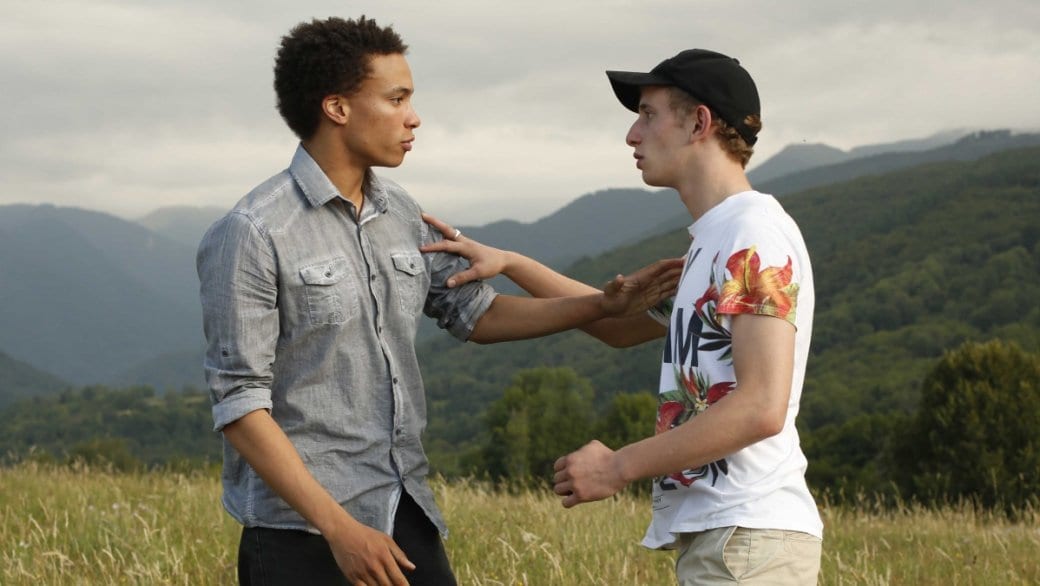Born in 2007, the Inside Out Ottawa LGBT Film Festival brings the world’s best queer cinema to Bytown in a compact three-day format.
Despite its small stature, there’s a wealth of work on offer, and Daily Xtra is here to help you find the standouts.
Being 17 (Quand on a 17 ans)
Coming of age films often follow a standard formula: awkward teen meets handsome stranger, sparks fly, the end. But French director André Téchiné’s latest offers an unexpected twist on this familiar narrative.
Damien (Kacey Mottet Klein) is a smart kid suffering at the hands of the school bully Thomas (Corentin Fila). But when his mother (Sandrine Kiberlain), unexpectedly invites his tormenter to move in with them, things get predictably worse.
Shot against the stunning backdrop of France’s Pyrenees Mountains, its Téchiné’s first film to explore coming out since 1994’s Wild Reeds. The genre often aims for feel-good stories, but Being 17 has all the confusion, rejection and literal bruises of a realistic exit from the closet. Dark and sexy, with a hint of romance, it perfectly charts the complex beauty of sexual awakening and the internalized homophobia that often accompanies it.
Descriptions of Annalise Ophelian’s documentary might make you think it’s all about Miss Major Griffin-Gracy. The pioneering trans activist’s story is certainly central. But rather than a simple retelling of her life, it uses her narrative as a frame for discussing the experiences of trans women of colour more broadly.
Systemic discrimination, persistent violence and battles with the criminal justice system all play a role in her story and the stories of her community. Despite its darker elements, the film doesn’t propose optimism as struggle’s antidote. Instead, it sees it as its consequence. Ultimately, Major! becomes a work of unbridled joy and a testament to one of our community’s most marginalized populations.

Culturally specific coming-out films often feature characters trying to escape their heritage in order to accept their desires. American director Andrew Ahn’s debut feature puts an interesting spin on this story with a character that does the reverse.
David (Joe Seo) is the son of deeply religious immigrants living in LA. Struggling with his desires and his relationship to his cultural identity, he finds unexpected solace and sexual awakening in one of his neighbourhood’s cruisy Korean spas.
Considering it’s largely set in a bathhouse, Spa Night handles sexuality very delicately. Ahn’s protagonist is stuck mostly in the “look but don’t touch phase” of coming out. But while it’s very much of its community (nearly all the dialogue is in Korean) the character’s journey points to a familiar experience social pressures are culturally specific but certain parts of coming out are universal.

Carly Usdin’s debut feature is billed as a black comedy. But despite its title, the film’s true darkness takes a long time to manifest. New couple Penny (Lindsay Hicks) and Jasmine (Brittani Nichols) join their married friends Jordan (Brianna Baker) and Billie (Jasika Nicole) for an afternoon barbecue.
The former are initially enamoured with their friends’ apparent long-term stability. But the day goes awry when the illusion Jordan and Billie have created starts to crack. Shot over a single weekend in the LA home of one of the actors, it’s delightfully improvisatory and at the same time it’s incredibly precise. Laugh-out-loud funny with a gut-punch climax, Suicide Kale reminds us that every relationship looks different from the inside.

Since Brokeback Mountain proved straight audiences are willing to see gay films, production companies have been happily offering up these narratives for popular consumption. The trade-off for wider exposure often means sanitized narratives of respectable queers. But Théo and Hugo is not one of those films.
After a literally pornographic first 20 minutes (full-on erections, fellatio and penetration), we go on an unexpected ride through sexual politics, shame and self-hatred. Directorial duo Olivier Ducastel and Jacques Martineau’s latest work offers up hard truths about the realities of gay life not intended for straight audiences. At the same time, it provides an unexpectedly sentimental takeaway — sometimes anonymous sex really can lead to true love.

Inside Out Ottawa LGBT Film Festival
Nov 11–13, 2016
insideout.ca/ottawafestival


 Why you can trust Xtra
Why you can trust Xtra


